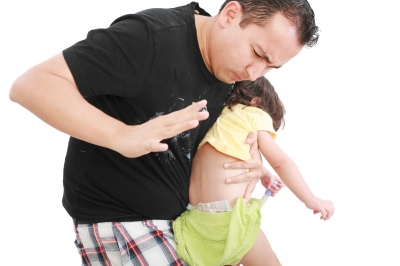Does Punishment Really Work?

I have always been interested in the question of what inspires people to be their best. Why do some people have a tendency towards violence or addiction or cruelty? Why are there people that only seem to care about themselves? And what makes someone spend their entire life dedicated to serving others?
America is a punitive society and has grown increasingly more so in my lifetime. Our prison population has had about a 8.5x increase since 1980! We have the 2nd highest per-capita incarceration rates in the world. Most prisoners are not violent when they go into prison, and are at higher risk for deviant behavior when they leave.
Parents and teachers also struggle these days with difficult children who are disrespectful , argumentative or uncooperative. The default approach stems from the belief that punishment is a deterrent.
But is punishment really an effective deterrent?

“Stopped by a Police” by digidreamgrafix courtesy of freedigitalphotos.net
You might say yes, if you think about getting a speeding ticket. If we know an officer is around, we slow down. But the threat of punishment only slows us down in the presence of an officer! Some of us drive the speed of traffic because we believe we can be safer drivers. We would drive this way regardless of whether a cop was around. Which would be better? To have a population that understands to be safe, one must drive at a reasonable speed? Or a population that only drives at a reasonable speed because they fear retribution?
Similarly with kids, repeated and harsh and unfair punishment, increases the likelihood of these kids ending up in prison. Students of color have been disproportionately targeted for even minor offenses, and are often sent away from the classroom or home. It’s been appropriately called the “school-to-prison pipeline”. Being sent home maybe intended to be a punishment, but depending on the home environment and the age of the child, it may or may not be seen that way by the child. Plus, being sent home means that the kid is no longer in school and no longer under supervised care. We are sending them home to the very environment that caused them to act out in the first place!
When children see that they are being treated more harshly, instead of feeling more desire to comply, the student often understandably develops the belief system that the school officials and teachers are not fair. If they see that punishment is only reserved for certain ethnic groups, then, what incentive do they have to behave well? They usually start to think, “It doesn’t matter what I do. I’ll always be seen as bad”.
That external projection that they are bad by teachers or parents programs their subconscious to make them believe they are bad. If they don’t believe they can change how they are perceived by adults, and they have no one that believes in their potential, then they have no incentive to try.
The statistics reflect that harsh punishment and unfair punishment is doing more harm than good. A study of 1 million Texas public school students found that kids who were suspended more, were much more likely to have contact with the juvenile justice system within the year of punishment!
reflect that harsh punishment and unfair punishment is doing more harm than good. A study of 1 million Texas public school students found that kids who were suspended more, were much more likely to have contact with the juvenile justice system within the year of punishment!
So how do we effectively inspire people to be their best?
First we need to realize that people who behave badly often don’t have complete control over their behavior. Why do I believe this? Because bad behavior is driven by negative emotions such as fear, anger, pride, frustration, resentment and bitterness. I don’t believe most people who have less control over their emotions are not inherently bad people. Their brains just aren’t cooperating with them!
This all comes down to our pre-frontal cortex (the PFC), often called the CEO of our brain. It is located behind our forehead and is what helps us make responsible choices. It’s ability to do the job is based on the environment we’ve been exposed to all the way from in the womb, until it stops developing around 23 for girls and 28 for boys. What shapes the PFC is dependent on the amount of stress we are exposed to, drugs, hormones, social experiences (with parents, peers, teachers, etc), and sensory stimuli.
People with a healthy PFC has been often been taught effective decision making strategies, and lived in a healthier environments. Even if they have had abuse, they have had at least one person in their life who has taught them coping strategies or given them support. They’ve grown up in an environment where they could learn how to get their needs met, without acting out.
People who come from unpredictable backgrounds, full of violence, neglect, abuse, or have learning disabilities struggle more. If they haven’t gotten the support they needed to learn how to effectively communicate to get their needs met, their PFC doesn’t develop in the way that it should. Without having effective strategies, their emotions easily hijack their rational thought process.
So how do we help kids develop a healthy PFC? Can we reshape adult brains as well?
I believe with the right interventions we can.
Dr. Ross Greene, author of The Explosive Child has developed an intervention program called Collaborative and Proactive Solutions or CPS, that is showing incredible decreases in delinquency. It is based on the notion that kids that are challenging don’t have the skills to accomplish their goals. A teacher or parent is taught to brainstorm with the child in order to help them understand what drives outbursts or bad behavior. Then once they discover the underlying reasons, then they collaborate to find alternative solutions for appropriately dealing with similar problems in the future. Dr. Green’s website also has tools to also work with children with significant learning disabilities or communication challenges.

Photo By Anssi Koskinen via http://imagefinder.co/
Finland’s prison system is an example showing how to motivate criminals to become productive citizens. In the 1960’s they learned through a series of studies that punishment doesn’t reduce crime. Over the next three decades, they’ve slowly changed their penal policy to have reasonable sentences where prisoners are treated humanly. Importantly, they are given what they need to be a contributing member of society. They have gone from having one of the highest to one of the lowest incarceration rates in the continent, with no change in crime. Importantly 40-70% of prisoners in America likely to recommit crimes, whereas is Finland, that number is just 20-30%.
So now that we know that we can change via neuroplasticity under the right circumstances, shouldn’t that be our focus? So many of our disciplinary methods are based on old outdated models that punishment is an effective motivator for change. But research says that it tends to do more harm than good.
Changes to our current punishment based systems are going to take courage on our part. We are going to have to recognize that we do not all grow up in similar environments, with similar support and privileges. America is going to have to admit that what we’ve been doing isn’t working and that other countries have figured out more effective solutions. We are going to have to let go of the economic forces (ie for-profit prisons) that benefit from having larger prison populations. We are going to have to learn to stop blaming, and start showing more empathy and compassion.
What if a policeman stopped to require you to take a safe driving course, rather than give you a ticket? What if this course taught about how speeding could kill you and others on the road. What if this course introduced you to victims of speeding accidents and helped you really connect with their pain? What if it taught you effective strategies for over-riding your impulses when you had a desire to be reckless? Would this more effectively inspire you to drive safely? I think it is worth trying. What do you think?

“Father and Son” by Ambro courtesy of freedigitalphotos.net
If you are a parent, teacher, or someone who is in working in the prison system or the police force, if you are finding it difficult to implement the more compassionate approach, then this probably means you were not given the support you needed either. It is extremely hard to show compassion to others if we haven’t received enough of it ourselves. Any negative experiences at work or with a difficult child can also harden your heart. If this is true for you, you can practice meditation, or listen to my interview, Releasing Subconscious Barriers: The Key to Health and Happiness and call me at 1855 ENERJOY for a complimentary consultation.



